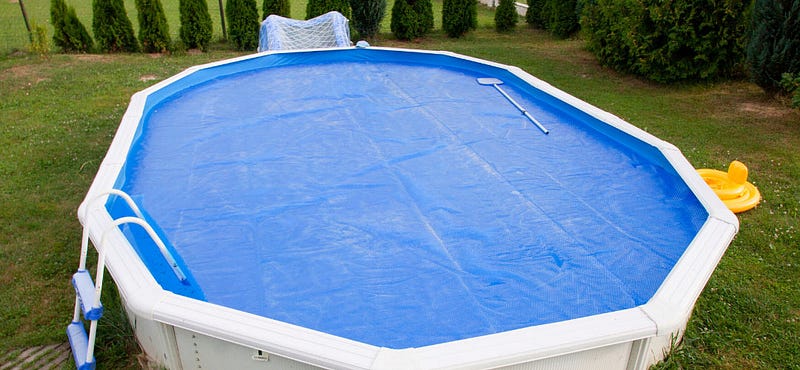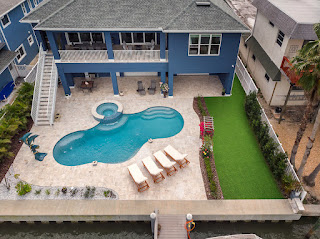Pools By Jordan Largo FL - Must Have Above Ground Pool Accessories
Unless you live in a very warm place like Florida where year-round swimming is common, you will need to winterize your above ground pool to protect it during the frosty months. The goal of winterizing your pool is to prevent damage to it from the snow or frozen water. By taking care of your pool now, you make it easier to enjoy it during the swimming season.
Harsh winter conditions can damage an above ground pool to the point of needing repairs or having to replace the pool. And even if you need to make minor repairs to your pool and get the chemicals back in balance after a harsh winter, taking the right steps now can prevent a lot of the larger — and more expensive — headaches.
You can take the steps yourself and winterize your above ground pool, or you can ask your pool service technician to do it for you. If you call in a professional, you will have to pay for the service.
Step 1: Keep Your Pool Chemically Balanced
In the weeks leading up to the closing of your above ground pool, make sure that you keep your pool as chemically balanced as possible. Specifically, you want the pH, alkalinity, and calcium hardness levels to be within an appropriate range. This will make it easier to complete the following steps.

Step 2: Shock and Deep Clean the Pool
Three days before you plan to close the pool, use pool shock to get rid of any contaminants. Skipping this step could lead to algae growth and stains while your pool is covered.
The day you close your pool, give it a deep cleaning to further protect it during the winter months. Vacuum, brush, and skim your pool to remove all the crud. This helps to prevent stains and ensure that your winter chemicals last.
Step 3: Safely Store Accessories
Remove and store all pool accessories indoors if possible. This includes:
- Skimmer baskets
- Automatic pool cleaners
- Solar blankets
- Pool alarms
- Pool ladders
- Removable steps
- Return fittings
These accessories won’t benefit your pool while it’s covered. But by moving them into indoor storage, the weather can’t damage them.
Step 4: Reduce Water Level
To prevent frozen water from damaging your above ground pool skimmer, it’s a good idea to reduce the water level in your pool to about three or four inches below the opening of the skimmer.
You don’t want to remove too much water from your pool because that could cause damage to its liner or walls. If you have any questions about how much pool water to remove when closing your pool, ask your service technician or the professionals at your local pool store.
Pro Tip: Don’t forget to turn off the power or gas to your pool heaters! This will protect your pool and ensure that you don’t waste energy heating a closed pool.
Step 5: Drain Equipment and Plug the Pipes
You need to drain the water from all of your pool equipment. This includes your pump, filter, heater, and all other equipment that holds water. If you don’t, that water will sit in the equipment for months, and if it freezes, the expanding water could destroy it.
Once thoroughly drained, you will need to plug the pipes with drain plugs or caps. This keeps the pipes protected during the winter and ensures that water doesn’t seep back into the equipment.
Step 6: Add Special Chemicals
There are certain chemicals you can add to your pool before covering it that will make reopening your pool in the spring faster. These include:
- Winter algaecides that prevent biological growth
- Floaters that time-release chemicals as needed throughout the winter
- Oxidizers that remove carbon dioxide from pool water and reduce algae growth
- Phosphate-removing chemicals
If you plan to close the pool yourself, you can purchase winter chemical kits that bundle the chemicals in one convenient package.

Step 7: Cover Your Pool
The last step when winterizing your above ground pool is to secure a pool cover that prevents debris from getting into the water. There are winter pool covers available in a wide range of shapes and sizes. Some versions require you to tie on the cover using a cable.
If you live in a snowy climate, there are other products you can buy to break up the ice that forms under the cover. And if trees surround your pool, you can purchase a special leaf catcher that makes it easy to clear all the leaves and sticks that fall onto your pool cover at once.
After you winterize your above ground pool a few times, the process will seem easier as you gain experience. Even if it seems like a hassle, the extra effort is well worth it to protect your pool and minimize repair costs. A bonus? Most of the steps on this list can be completed in a day.


.jpeg)
Comments
Post a Comment